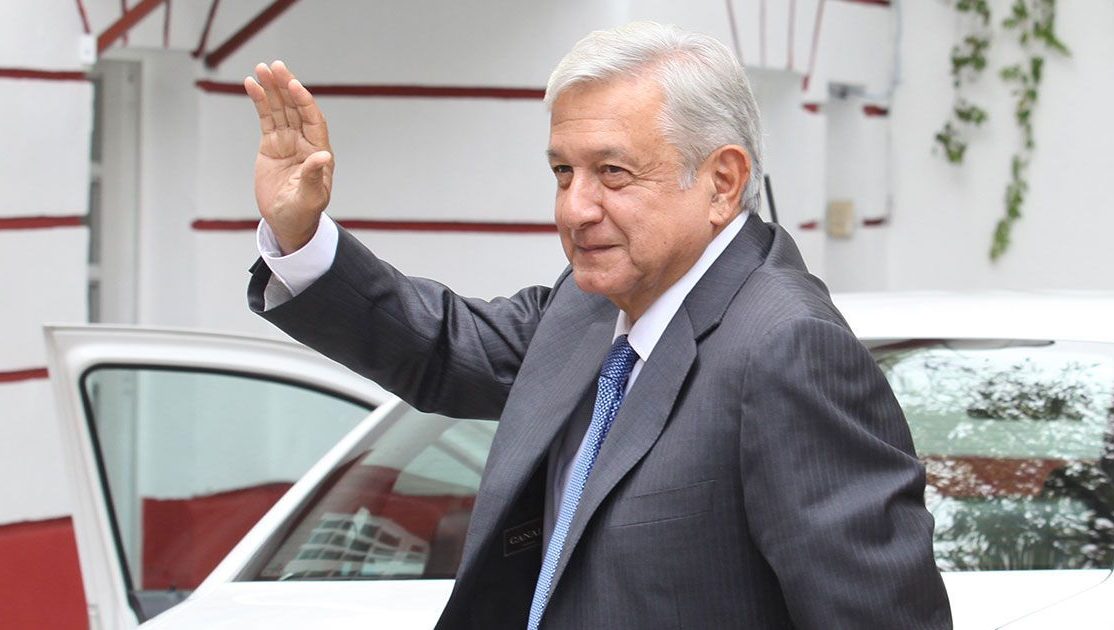“The country has been bankrupt for 30 years, ever since neoliberal policies have been implemented,” declared Mexico’s president-elect Andrés Manuel López Obrador at the first rally of his so-called “gratitude tour” in Estado Nayarit. He explained that, while the country’s bankruptcy meant that he would not be able to address all of its problems, he would still deliver everything he had promised during last summer’s electoral campaign. The crowd erupted into cheers, but López Obrador’s words sparked a heated public debate throughout the country in the days following the September 16 rally.
As numerous critics were quick to point out, López Obrador’s assertion that Mexico is bankrupt is wrong under any conventional definition of bankruptcy. While the Mexican government’s debt grew by 15% from 2013 to 2016, it is still meeting its payments. Outgoing Treasury Secretary Antonio González Anaya released a statement echoing this point, saying that “Mexico has healthy public finances and has stability anchored in this health.”
With refutations mounting, López Obrador accused the “fussy press” of taking his statement out of context. He doubled down at an impromptu airport press conference two days later: “Crisis is not measured only in macroeconomic variables. There is poverty, insecurity, and violence.” Again, he insisted that he would fulfill his campaign promises despite Mexico’s bankruptcy.
The real problem at hand is not López Obrador’s apparent misunderstanding of bankruptcy or any supposed repudiation of his campaign promises. Rather, it his accusatory and aggressive stance in the face of potential failure that ought be cause for concern.
Indeed, López Obrador’s assessment of the potential for a crisis at the same September 16 rally has been somewhat underreported compared to his assertion of bankruptcy: “If [an economic crisis] occurs, it would not be the president’s fault, but because of external circumstances or the mismanagement of financial policy by the Bank of Mexico.” The fact that López Obrador is preemptively shifting blame away from himself is indicative of the problems that might await his administration in the face of an actual crisis.
With his inauguration less than two months away, the president-elect remains something of a wild card. It is worth remembering that his dominant electoral victory was preceded by two unsuccessful runs in 2006 and 2012, during both of which he was hampered by accusations of radicalism and comparisons to Venezuela’s Hugo Chávez. After his 2006 loss, he engaged in outright authoritarian behavior when Mexico’s electoral tribunal rejected his allegations of fraud. For a month, thousands of his supporters lived in a tent city in Mexico City’s historic center to protest the decision. López Obrador stoked their anger, roaring “to hell with their institutions” in one particularly fiery speech. A few months later, he staged a mock inauguration, declaring himself Mexico’s legitimate president. With this in mind, his recent attempt to cast Mexico’s central bank as a potential scapegoat is worrisome. It gives credence to his critics’ worst fear—that, as president, López Obrador will go beyond the rhetorical realm and take concrete actions to discredit and weaken Mexico’s institutions.
But the 2018 campaign saw López Obrador take a very different approach. His party, Morena, built an ideologically-diverse coalition and garnered popular support by honing an anti-corruption message. López Obrador promised that his election would bring an end to what he called the “mafia of power” and bring about the fourth great transformation of Mexican civil society, succeeding Mexico’s independence from Spain in 1821, the Reform Wars of the 1850s and 1860s, and the Mexican Revolution of the 1910s. The Mexican people responded enthusiastically at the polls, handing him the largest presidential victory in Mexico’s democratic history.
But now the time for talk is nearly over, and perhaps López Obrador is growing nervous at the prospect of governing. His campaign promises will come at significant cost—he insists he will increase public spending on pensions, higher education, and infrastructure without increasing taxes. Morena’s majority in Congress has already passed a controversial austerity law slashing government salaries. Although the cuts will help foot the bill, they will also trigger an exodus of talent from the government’s ranks, as highly-trained officials will be more easily tempted by the private sector once their incomes fall. Furthermore, López Obrador will find that eradicating corruption is easier to promise than to do. Throughout the campaign, he made it seem as though all the corruption in Mexican politics would disappear the second he assumed office. But magic doesn’t exist.
To be fair, López Obrador has made a commendable effort to unite the country and prepare himself to assume office since the election by meeting with the candidates he defeated and filling his Cabinet with qualified experts. Additionally, his musings about bankruptcy reveal that he has some of Mexico’s most pressing issues in mind—last year was Mexico’s most violent year on record with over 29,000 homicides, and 43.6% of Mexicans live below the national poverty line. However, those same musings have raises serious questions about López Obrador’s temperament given the difficulties he is sure to face as he pursues his vague but ambitious agenda. How he responds to these challenges will define his administration and shape Mexico’s political and economic landscape for the next six years and beyond. For the sake of both the country and his legacy, López Obrador should learn from his mistakes and leave the scapegoating in the past.

